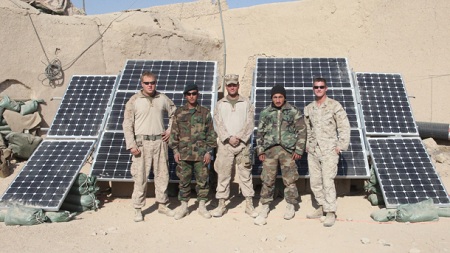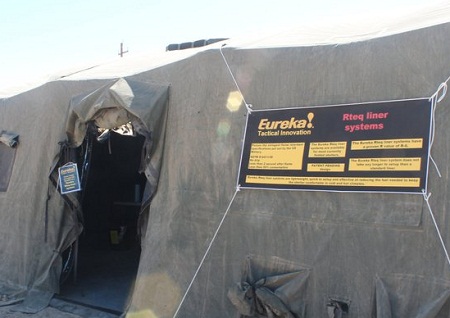We’ve chronicled countless green U.S. military initiatives that make such patently good sense that here at EarthTechling, there’s a high comfort level with our fighting forces embracing clean energy. But while even many hardcore military backers get it, there are critics who mock the movement. Which is why the recent Naval Energy Forum once again featured Secretary of the Navy Ray Mabus explaining the rationale.
It’s pretty simple, actually: “We are a military organization, and we’re doing this so that we can be a better military organization, so that we can fight better, so that we can perform the duties and missions given to us by this country,” Mabus said in his remarks.

“This isn’t trendy, this isn’t flavor of the day,” Mabus went on. “We’re not just doing this because we want a little pop here and there or because it’s somehow what people are talking about today. We’re doing it for the Navy. We’re doing it for the Marine Corps. We’re doing it for the United States of America to become energy independent, and we’ve got lots of reasons.”
Mabus reminded the gathering that the Navy has been here before – pushing the envelope on energy.
“We pioneered energy use and have almost throughout our entire history: in the 1850s, sail to coal; in the early 20th century, coal to oil; in the 1950s, pioneered the use of nuclear for transportation,” he said. “And every single time we did, without exception, there were these naysayers that said, you’re trading one very proven form of energy we really know how to use and we’ve got a lot of infrastructure invested in, and we’ve got sail lofts or we’ve got coaling stations around the world, or it’s too dangerous, in the case of nuclear. And most of the time they were inside the Navy saying this. And every single time – every time, without exception – they’ve been wrong. And I have absolutely no doubt they’re going to be wrong this time too.
“This is what we do. We change the way we use and produce energy, and we’re doing it again, and we’re at the cutting edge, which is where the Navy has always been on energy use.”

You want a real-world example of how this newfangled green stuff is helping the warriors? Mabus provided one, from the Marine Corps:
“Last fall, a year ago right now, 1st Marine unit, 3rd Battalion, 5th Marines went into some of the hottest fighting in Afghanistan, in Sangin, Helmand province, taking alternative energy devices with them. And they were sort of given these going out the door. It was, here, give this a try, see if it works.
“In the middle of this fight, they tried. They cut their headquarters’ fossil fuel usage by 25 percent. They cut some of their Forward Operating Bases and their combat outposts about to 90 percent. And it had some additional advantages. They’ve got solar – we call them solar blankets, but they’re about this big. And you can use them to power radios or GPSs. In the ‘90s, a Marine company had about 15 radios; today, it’s got more than 200. By using these solar blankets, average Marine company saves 700 pounds of batteries they don’t have to pump. And it cut them loose from being resupplied. And it saves us about $50 million a year in resupplying batteries and it cost $25 million a year; not a bad deal.”
And, should you consider the Marines too wimpy, even the Seals seem to be getting into it, according to Mabus:
“And finally, in terms of announcements or things that we’re doing, we’re sending a SEAL team back into deployment. And that SEAL team is going to be net zero in energy. They’re going to produce all the energy and the drinking water that they need. They’re going to use flexible generators that are many times more efficient than the generators we’re using today. They’re using portable solar battery chargers. They’re using portable solar rays. They’re using highly portable water purification units.
“Those SEALs won’t have to be resupplied. They can stay out way longer than they’ve ever been able to before. You hear about our special operators, and they are special. Allowing them to not have to be resupplied with the fuel and water will make them even better at what they do.”